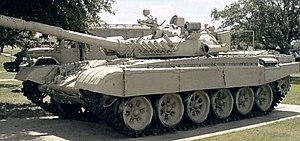Asad Babil
| "Lion of Babylon" | |
|---|---|

A captured Iraqi T-72 on display at Fort Hood
|
|
| Type | Main battle tank |
| Service history | |
| Wars | Persian Gulf War, Iraq War |
| Production history | |
| Designer | Kartsev-Venediktov |
| Produced | 1989–1990 |
| No. built | Disputed, few completed besides prototypes 100 (Russian claims) None finished (Polish claims) |
| Specifications | |
| Weight | 41.5 tonnes (45.7 short tons) |
| Length | 9.53 m (31 ft 3 in) gun forward 6.95 m (22 ft 10 in) hull |
| Width | 3.59 m (11 ft 9 in) |
| Height | 2.23 m (7 ft 4 in) |
| Crew | 3 |
|
|
|
| Armor | Mild steel, 45-300mm |
|
Main
armament |
125 mm 2A46M |
|
Secondary
armament |
|
| Engine | V-12 diesel 780 hp (582 kw) |
| Power/weight | 18.8 hp/t |
| Suspension |
Torsion bar Some dampers removed to suit desert conditions |
|
Operational
range |
425 km 600 km with fuel barrels |
| Speed | 60 km/h (road) 45 km/h (off-road) |
Lion of Babylon or Asad Babil (Arabic: اسد بابل) is the name given to a project of the Ba'athist Iraqi army to locally produce the Soviet T-72 tank during the late-1980s. The tanks were to be assembled at a factory near Taji, Iraq. This project represented an attempt by Saddam Hussein's regime to locally manufacture tanks, triggered in part by the Western embargo against the sale of military vehicles to Iraq during the Iran-Iraq war. However it is disputed if any tanks have ever been finished.
The Lion of Babylon tank draws its name from the Lion of Babylon, an ancient Babylonian symbol representing ruling power. The name is sometimes incorrectly used to refer to T-72s in Iraqi service, which were imported from the Soviet Union and Poland.
In 1986 a West German company built a factory in Taji to manufacture steel for several military uses. It was enlisted to retrofit and rebuild tanks already on duty in the Iraqi Army, such as T-54/55s, T-62s, and several hundred of Soviet and Polish T-72s, imported during early stages of the war with Iran. In the late-1980s plans were made to produce new T-72M1 tanks in Taji. These tanks were to be assembled from knockdown kits delivered by the Polish state-owned company Bumar-Łabędy. The assembly was to start in 1989 and the tanks would receive the name Asad Babil (Lion of Babylon). According to Polish officials not a single T-72M1 was finished, even though in 1988 a T-72M was displayed on an Iraqi arms show, which was claimed to be locally produced. The local assembly of the T-72 started in Taji in early 1989 as suggested by Iraqi officials. A number of Iraqi officials such as Lt. General Amer Rashid however did not like the idea of being dependent on knockdown kits supplied by another country and pushed for the complete production of the T-72M1 tank instead. In 1991 the Taji plant was destroyed by an airstrike while being upgraded by Bumar-Łabędy.
The United Nations imposed an arms embargo following the Iraqi invasion of Kuwait in August 1990, which reduced the complete assembly of tanks to simple spare parts for Lions and other tanks in the Iraqi arsenal. It is not known how many Lion tanks were completed during the span between early 1989 and this embargo.
...
Wikipedia
